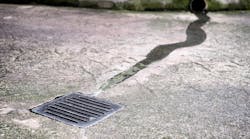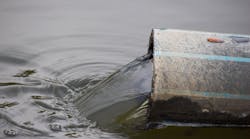RALEIGH, NC, July 21, 2014 -- Researchers from North Carolina State University are looking to rain gardens as one way to remediate the water quality concerns caused by urban stormwater runoff. Rain gardens -- also known as bioretention cells -- are depressions in the landscape that trap stormwater runoff so microbial activity, filtration/adsorption and plant uptake can remove pollutants. Typically, the gardens are excavated, backfilled with a filter bed substrate, then planted with vegetation that helps to remove pollutants.
"The filter bed substrate is the foundation of the rain garden and gives it the ability to infiltrate runoff, slow drainage, support plant growth, and remove pollutants," explained Helen Kraus, lead author of a study published in HortScience. Kraus and her colleagues designed experiments to assess three different filter bed substrates for their effectiveness in nutrient removal and supporting plant growth.
The research team constructed 12 rain gardens filled with one of three filter bed substrates. The gardens were planted with 16 plant species and then irrigated with stormwater. The substrates used in the experiments included a sand-based substrate (sand) composed of 80% washed sand, 15% clay and silt fines, and 5% pine bark; a soil-based substrate (soil) composed of 50% sandy loam soil and 50% pine bark; and a slate-based substrate (slate) composed of 80% expanded slate and 20% pine bark.
The substrates differed in infiltration and drainage rates as well as chemical composition. Further, diverse plant species that included trees, shrubs, herbaceous perennials, a grass, and a rush were selected to allow the researchers to evaluate the performance of a wide range of evergreen, deciduous, woody, and herbaceous plants.
Results showed that sand had good overall retention of pollutants except nitrogen. Soil had the lowest remediation of phosphorus and highest concentration of phosphorus in its effluent and was similar in nitrogen removal efficiency to slate. Slate had the best retention of nitrogen and phosphorus. "Overall, all three substrates functioned in reducing the quantity of pollutants in urban stormwater runoff," the authors noted. They added that the impact of substrate on remediation appeared to lessen by the second season of the study; as the plants grew, root growth impacted infiltration, and nutrient uptake by the plants increased.
The researchers determined that 11 of the 16 species used in the experiments grew well in the rain gardens. Betula nigra (river birch), Betula nigra 'Duraheat', Magnolia virginiana (sweet bay magnolia), Magnolia virginiana 'Sweet Thing', Itea virginica (Virginia sweetspire), Itea virginica 'Henry's Garnet', Panicum virgatum 'Shenandoah', Juncus effuses 'Frenzy', Helianthus angustifolius (swamp sunflower), Helianthus angustfolius 'First Light', and Eupatorium purpureum subsp. maculatum (Joe pye weed) performed well in the experiments and could be used as rain garden plants, according to the authors.
See also:
"MN develops first-of-its-kind stormwater management program using trees over pipes"
###


